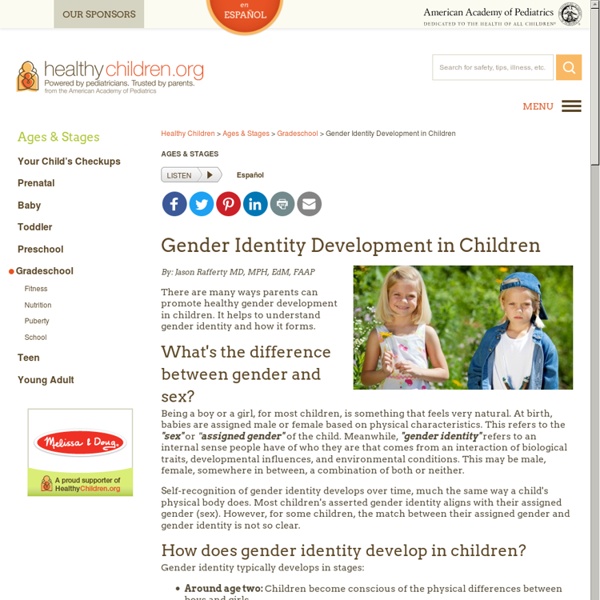How Albert Bandura's Social Learning Theory Works
Learning is a remarkably complex process that is influenced by a wide variety of factors. As most parents are probably very much aware, observation can play a critical role in determining how and what children learn.1 As the saying goes, kids are very much like sponges, soaking up the experiences they have each and every day. Because learning is so complex, there are many different psychological theories to explain how and why people learn. A psychologist named Albert Bandura proposed a social learning theory which suggests that observation and modeling play a primary role in this process.2 Bandura's theory moves beyond behavioral theories, which suggest that all behaviors are learned through conditioning, and cognitive theories, which take into account psychological influences such as attention and memory.
Gender identity
Gender identity refers to the deep and intimate feeling a person has of themselves. Children begin to understand and express their gender identity early in life. This article discusses how gender identity typically develops and how parents and caregivers can promote healthy development of gender identity and expression in children. It's important to remember that each child is unique and may develop at a different pace. What we mean by gender: Some useful definitions
Social Learning Theory of Gender by Bandura - ScienceAid
Edited by Jamie (ScienceAid Editor), Taylor (ScienceAid Editor), MaxScience, Sharingknowledge The Social Learning Theory was proposed by Bandura as a way of explaining how children acquire their gender identity based on the influence of other people (particularly their parents). Stages of Learning
3.2: How Children Develop Identity - Social Sci LibreTexts
The Role of Early Childhood Education and Play Where we truly start seeing social identities begin is within families and their culture. Where we see social identities cultivated, especially in the classroom is through play. Children develop self-identity, who they believe themselves to be, and begin to form relationships through play and peer relations which contribute to their emotional, social and cognitive development. Theories of self generally agree that an early childhood program can foster children’s self- esteem and build the foundation for future relationships with others. Early childhood is a significant period for the children’s development including the emergence of their abilities and skills in areas such as language, physical development, psychosocial development, and cognitive development.
Gender roles and identity in children
It’s common for people to think of the terms ‘sex’ and ‘gender’ as being the same, but they mean different things. Someone’s sex refers to their physical biology: being male or female. A person’s gender identity, however, is a person’s sense of who they are – male, female, both or neither. Your gender identity is a deep sense of your own gender. In some cases, a person’s gender identity may be different from their biological sex. When do children become aware of their gender?
Gender Roles - an overview
5.1.2 Effects of gender identity on behavior Gender roles also create sex differences in behavior when people adopt them as gender identities. Masculine and feminine identities guide behavior through self-regulatory processes. That is, people use their gender identity as a personal standard by against which to evaluate and guide their behavior (Moretti & Higgins, 1999; Wood, Christensen, Hebl, & Rothgerber, 1997).
Gender-Role Development
Gender-role development is one of the most important areas of human development. In fact, the sex of a newborn sets the agenda for a whole array of developmental experiences that will influence the person throughout his or her life. The often controversial study of the development of gender is a topic that is inherently interesting to parents, students, researchers, and scholars for several reasons.
Commentary: What’s behind varying attitudes about gender equality in Singapore
SINGAPORE: For all the progress made in improving understanding between men and women in the road towards gender equality, the biggest hurdle to cross is the one between our ears. Some women’s issues in the news have sparked online debates on gender equality in Singapore – from Facebook to Twitter and Reddit. These online discussions typically raise the usual contentions: Females, without National Service obligations, have an unfair head start at work. Women are more likely to gain custody of young children after a divorce even if men are good fathers. Or that a woman’s accusation of a sexual crime is taken more seriously than a man’s denial.



